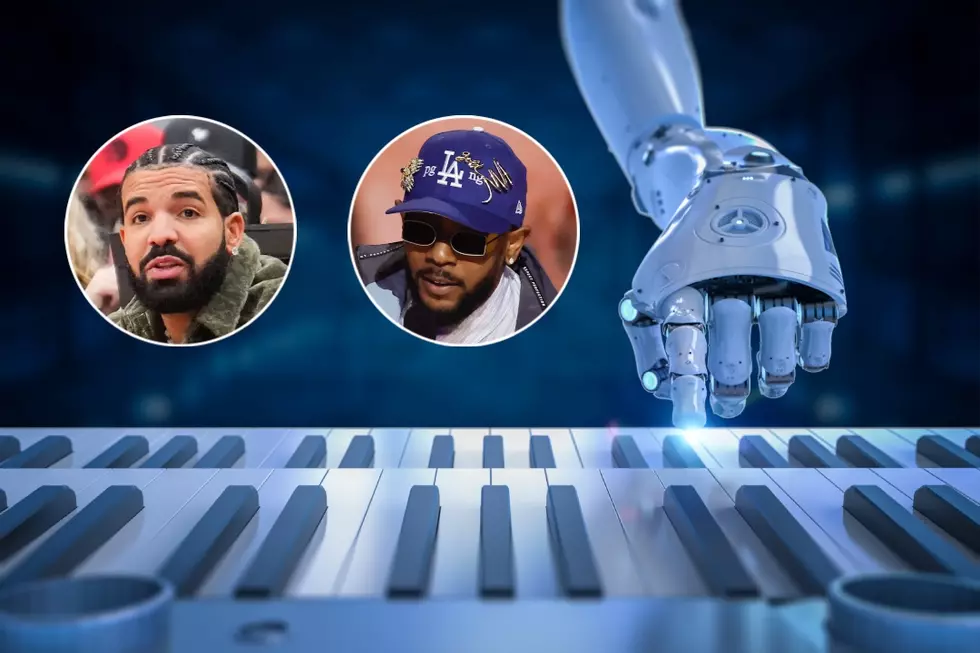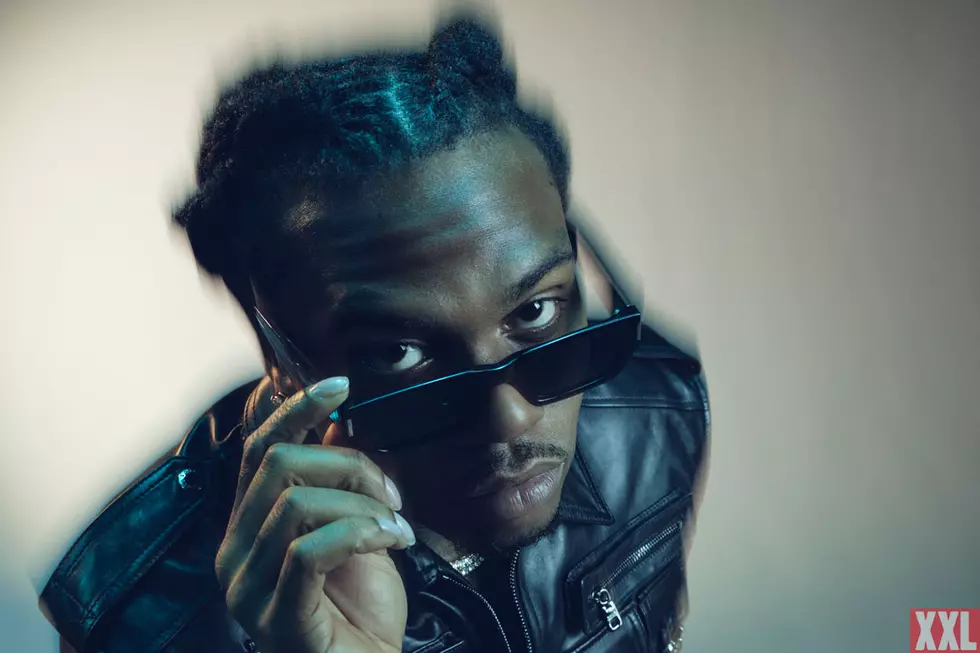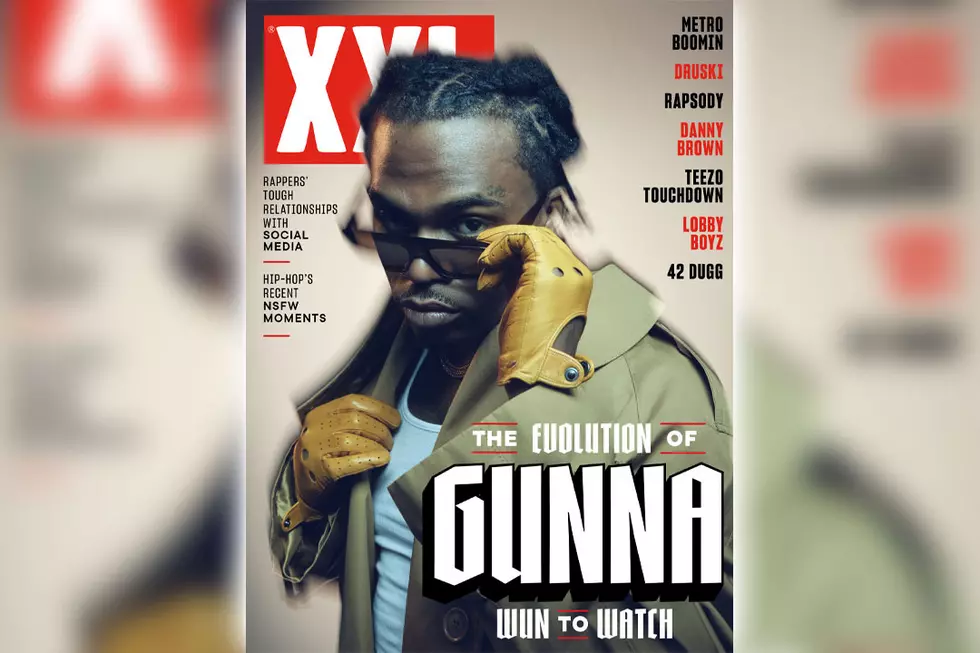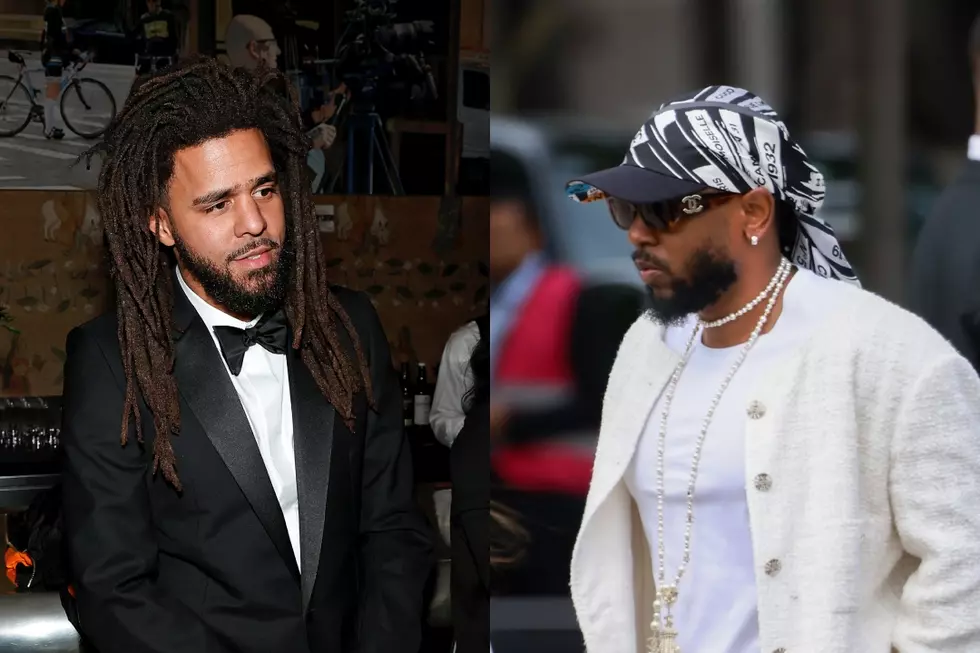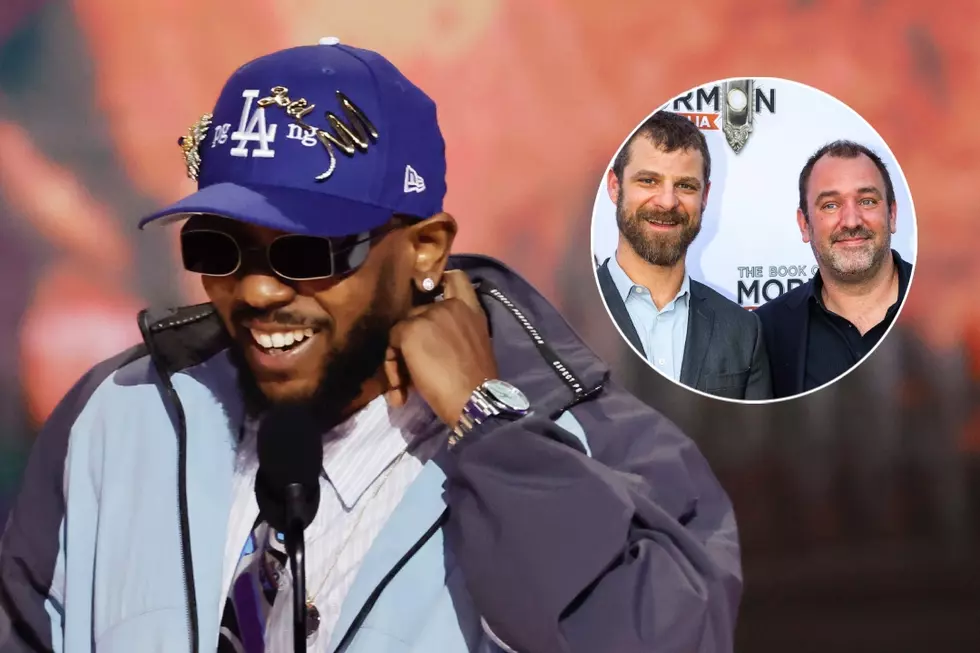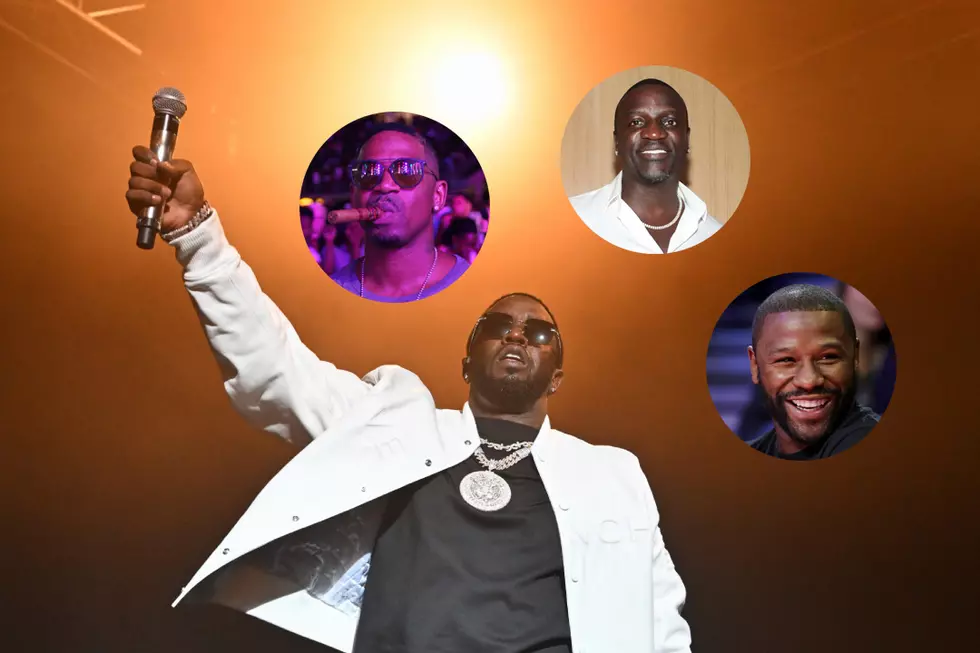
10 Untold Stories From People Who Helped Make Kendrick Lamar’s To Pimp a Butterfly Album
And just like that, Kendrick Lamar's To Pimp a Butterfly album has turned five. Laced with jazz, fury and Afrocentric raps, the LP earned universal acclaim from critics and has been deemed by fans to be the most important project of K. Dot's career.
While TPAB definitely left its mark on Kendrick's loyal fan base and the music industry as a whole, the imprint it left on the collaborators who contributed to the project is just as indelible. "If people ask me what's the greatest hip-hop album ever made, [if they] ask me, it is TPAB," says Rapsody, who provides a guest verse on "Complexion (A Zulu Love)." She is the only rap guest verse featured on the good kid, m.A.A.d city follow-up. "It's so powerful what he did with this album."
The power Rapsody speaks of is something others involved with the LP could sense as they were in the Top Dawg Entertainment trenches putting it together. "The things that were happening during those sessions and just how locked in everybody was, Ali, Sounwave, just everybody, it was a moment in time you knew like, 'Ahh, this feels like really, really special,'" says Rahki, a TDE-affiliated producer who crafted both the album's lead single, "i," and "Institutionalized."
For his part, Rahki remembers controlled chaos and K. Dot's level of engagement with the project. "Kendrick is such a quiet type of artist, I don’t think the general public really knows like how involved he is in every beat, every session, every…Like, he’s really a genius and it’s just him every day," recalls the producer, who bounced between two studios to help create "i." "It felt like madness, but a good madness."
Another person that can attest to the frenetic pace of TPAB sessions is famed jazz pianist-producer Robert Glasper, who says he played on nine of the album's songs, with eight of his contributions being delivered in a single day. "[Kendrick] kept saying, 'Pull up this song,' 'Pull up that song, play what you hear,'" remembers Glasper. "So he would pull up a song and I would just learn it real quick and then I would take one pass, one take and just play whatever I felt."
That freewheeling, "if it sounds good, use it" attitude that helped Glasper add sonic layers to TPAB also benefitted Knxwledge, whose previously unheralded "So[rt]" beat became the instrumental for K. Dot's TPAB standout, "Momma." "It’s one of those ones where like, if you see it, you’re going to be intrigued because the title is so crazy, the cover is so crazy and it’s five years ago now so like, if you see all the features and like… I would be intrigued if I was a new person just trying to get into music, listening to old stuff," Knxwledge tells XXL. "2015 was special."
Working with Kendrick Lamar, whether it was in the studio or through a phone call or a text message, the folks behind some of the album's most important songs knew they were a part of something that would last. Today, to honor the album's fifth anniversary, XXL reveals 10 untold stories from Rapsody, Robert Glasper, Rahki and Knxwledge as they discuss their contributions and reactions to the legendary LP.
Rahki
Produced "i" and "Institutionalized"Kendrick Made a Live Version of "i" Before Rahki Suggested to Change It
Rahki, who produced To Pimp a Butterfly's feel-good, Isley Brothers-sampling first single "i" and the anthropological "Institutionalized," got a front-row seat to the making of the former XXL Freshman's third studio album. As K. Dot fans know, the single version of "i" didn't end up making the final version of the LP. The album iteration of the song features a live-performance simulation rather than pristine studio polish. The producer was going to tell Kendrick about the changes he wanted to make for the album, but the Compton rhymer had already beat him to it.
What's funny about this process with me and Kendrick is a lot of times we be on the same page with lot of stuff. I remember thinking like, yo, I personally felt like the version that we did the single version [of 'i'] actually didn't fit the album and so I wanted to bring that up to him. What's so crazy is we were on his balcony—we were actually at a Super Bowl party at his crib—and I was like, 'Yo, I'm not really crazy about the 'i' [single version] that we did going on the album.'
He did a live version [of 'i'] on Saturday Night Live and it was so crazy to me that felt like it should be more of the vibe of the album. When I brought it up, Kendrick was like, 'Oh, I'm already on it,' like, 'We already doing a live version on the album.' I was like, 'Bro, amazing." I felt like every time I said it, he was on it.
Kendrick's Sleeping Habits During a Recording Session Were Mystifying
K. Dot is rap's equivalent of a gym rat, and that's something that is even more evident in Rahki's recounting of one particular studio session. Rahki has a strict code when it comes to the studio, but K. Dot's work ethic made him break it.
I always had this rule as a producer like never leave before the artist leaves. Obviously, right? You know, you don’t want to be that dude that’s leaving out even if you’re tired. But I just remember one time, I was so tired from just dealing with my son and just being in these sessions all night and I kept kind of falling asleep and every time I looked up, K. Dot’s still writing. It’s like four in the morning and I kind of fall back asleep and I wake up and I look up, K. Dot’s still writing and I’m like, yo, this dude does not stop!
But then what’s crazy is I had to bounce because I was like, yo, I got to get a couple hours of sleep and then I’ll come back in the morning. So when I came back that next morning, K. Dot had already beat me there. And I’m like, ‘Bro, did you stay the night?’ And he was like, ‘Nah, I left. I went and worked out and came back.’ And I was like dude, this dude is a machine, bro! How you even doing that?
Kendrick's Text Was a Sign of a Job Well Done
One year before he won four To Pimp a Butterfly-related Grammy Awards in 2016, K. Dot actually won two Grammys for Best Rap Performance and Best Rap Song at the luminous awards show in 2015. Kendrick wasn't at the 2015 awards show, but Rahki was, and as a result of Kendrick's absence, he got to deliver the acceptance speeches. The moment was a memorable one for Rahki, but just as unforgettable was the text Kendrick sent him a short time after the wins.
My best memory is probably, to be honest, winning the Grammy and me being able to go because we had went together the year before and you know, K. Dot was there ’cause that was for good kid, m.A.A.d city, so we kind of went there as a crew—me, DJ Dahi, Sounwave was there, Ali. The whole crew was there for that moment. For this moment, it was a bit different ’cause it was only for the single.
We had just made the cutoff for the Grammys for the single, but the album wasn't out yet and so Kendrick wasn't going to go to that Grammys because he was going to go to the next one for the album and then, you know, and that's when he did the performance and all that kind of stuff. So I was actually the only one there at the Grammys that year and that was the year that we won and this was the pre-televised one, so I actually got a chance to go up there and like get the Grammy and say a speech and do the whole thing.
I remember like, directly after that, Kendrick texted me and was like, 'Yo, are you alive, fam?' ’Cause there was just so much happening. He just knew that we had just won, so he was like, 'Man, like, are you alive?' So just that moment of just going through all that and then taking me backstage and doing the interviews and walking the red carpet again as a Grammy Award-winning producer was incredible. Everything was kind of happening fast that year. We were working every day. I was tired like crazy, but to be able to work with such a genius on something that I felt was gonna be really a classic album was amazing.
Salmon Was Often Kendrick's Food of Choice During Studio Sessions
Tales of chicken wing-eating and Hennessy-drinking litter the annals of rapper studio backstories, but K. Dot and company apparently took a different route. Rahki remembers the one spot Kendrick put him onto for their in-studio cuisine.
Kendrick put me on to this spot. We would always order from Sea Salt Fish. He put me on to this one joint, it was like this salmon plate we used to get. It was just a lot of fish and, you know, good seafood and things like that. You know, that's one of the main dishes I remember because after he put me on to that I remember ordering that all the time.
Robert Glasper
Worked on Nine SongsRobert GlasperSteven Ferdman, Getty Images Kendrick Wanted Robert Glasper on the Album Because the Original Piano Player "Didn't Really Cut It"
Robert Glasper, who's an acclaimed pianist and member of August Greene with Common and Karriem Riggins, says he contributed to nine of the 16 tracks on Kendrick's To Pimp a Butterfly—"For Free," "These Walls" and "Complexion (A Zulu Love)" included. He says the MC recruited him because the previous piano player they used wasn't a good fit for the LP.
Terrace Martin called me and he said, 'Yo, after your session can you come by Dr. Dre's studio? I am here with Kendrick, we
need you to play on something.' I was like, 'Bet.' So after I finished my session, I went over to Dre's studio and I walked in the session and it was Terrace and Kendrick and a few other cats there and the songs, the songs were already recorded.The songs were already done, but they needed me to replace the piano that was on 'For Free.' Basically, Terrace was like, 'Rob's in town. Let's replace him with Rob' because whoever they had on piano before didn't really cut it for what they needed. It was a super jazzy joint, you know what I mean? They needed a certain kind of vibe. They needed the vibe of [late jazz pianist] McCoy Tyner on that song.
Kendrick Showcased Nine Voices in the Studio
After working in the studio with K. Dot, Glasper came away impressed with the Compton rhymer's vocal malleability. Glasper says Kendrick showcased an unmatched amount of flows and voices throughout all the recording sessions.
What I learned is that this album more than any other album is how much respect I have for Kendrick as a rapper because most rappers, pretty much you know their cadence. Like, all your favorite rappers have a cadence and you know what that’s going to be. You know their voice, you know their cadence and that’s kind of what they do. But Kendrick on this album, this muthafucka had literally like nine or 10 different voices and different cadences. Sometimes in the same damn song.
It was literally like an opera. Herbie Hancock called it an opera. I remember I was in China and I was opening up for Herbie Hancock, and when I got off the keyboard, when I got off my set, I walked off the stage and Herbie was right there.
And I was talking to him and he said, ‘Man, congratulations on that new Kendrick Lamar album, To Pimp a Butterfly. It’s literally like an opera. I can’t stop listening to it!.'
It’s literally on a whole other level, bro. You can’t pin him down to just one sound and one cadence. You don’t know what he’s going to do, you don’t know where he’s going to come from. He’s like Bruce Lee of rap. Like Bruce Lee encompassed all the styles and made his own, so when he fights, he doesn’t just fight one way. [Kendrick] just knows hip-hop, but he just has so many different angles he can come from more than anybody hands down.
Kendrick Was Apparently Planning to Rap in a Different Voice for a Verse on "Complexion (A Zulu Love)" Before He Got Rapsody on the Track
Rapsody has previously spoken about how Kendrick had originally planned to have her rap two verses and Prince do the hook for "Complexion (A Zulu Love)." Now Robert Glasper says K. Dot had originally planned to alter his voice to rap on the section of the song eventually inhabited by Rapsody. Robert heard this tidbit after he'd added his part of the keyboard to the piece.
"I walked out of the thing, [Kendrick] was like, 'Yo, that's gonna be crazy. I'm gonna come back in with a whole ’nother drum beat and I'm gonna change my voice to rap in another voice on that part. But instead of rapping in a different voice, he called Rapsody."
Rapsody
Paras Griffin, Getty Images for ESSENCEParas Griffin, Getty Images for ESSENCE Kendrick and Producers Were Looking for a J Dilla Sound With "Complexion (A Zulu Love)"
"Complexion (A Zulu Love)" is a tune that serves as an ode to the need for self-love, and the tranquil beat its laced with emits positivity. This vibe is one that makes a lot of sense when you know the sort of sound K. Dot and company were going for. According to Rapsody, who appears on the song, she says J Dilla was the inspiration.
When I first heard the beat, I was in love with it. It was right down my alley. I was talking to Terrace Martin, who was telling me a little bit of the idea. They wanted something that felt like J Dilla and when I felt it, I was like, 'Yo, this is ill.' What I loved about the beat was that it gave me space, it gave me space to really say words and to really play with my lyricism, where people could hear me, you know?
I loved the groove and I loved the soul in it. It was something when I heard the song together and I heard Kendrick's first verse, which I love, and then I heard the clip, I was like, wow, they took it somewhere. It gave you chills when you heard the musicality together. I was in love with it. I didn't know where it was gonna fit in the grand scheme of things. All I got was my part and I was excited.
Kendrick's Unfair Criticism by the Public Came to Mind After "Complexion (A Zulu Love)" Was Heard for the First Time
Rapsody and Kendrick Lamar had only discussed "Complexion (A Zulu Love)" for a few minutes before Rap let K. Dot know she'd gladly contribute. The release of the song, which explores themes of colorism and Black love, came just a month before Kendrick appeared on a Rolling Stone cover in 2015, and faced criticism for being pictured on the cover with a light-skinned woman who was braiding his hair. Speaking to XXL, Rapsody remembers reflecting on the criticism Kendrick experienced when she heard "Complexion (A Zulu Love)" for the first time.
When I heard the completed song, the things he was talking about, I felt the power in it. And especially, this was at a time where I'm hearing this song, I'm thinking about things in my past. I am thinking about even Kendrick, what he was going through even with his girlfriend, [fiancée Whitney Alford].
I remember he was on the Rolling Stone cover getting his hair braided and everybody thought the girl braiding his hair hands were light and it was a whole thing where they both got attacked, and they were like, 'Yeah, another one, he don't like chocolate women,' and I am thinking, man, what has happened to us that we don't love ourselves and tear each other down based on our complexions?
Light skin, dark skin, this and that, at the end of the day we, all the same. We all beautiful and knowing, all these things.
Knxwledge
Produced "Momma"Kendrick's "This Is the One" Text for the "Momma" Beat Led to Another Session
Underground Los Angeles-baed producer Knxwledge had already dropped more than a dozen beat tape compilations before Kendrick had contacted him about using one of his sleepers for a song.
The Compton rhymer had been sitting in an old car without a roof at a photoshoot when Knxwledge's friend, who was the photographer, played Kendrick the song "So[rt]," a meditative, Lahlah Hathaway-sampling beat that had previously been released on Knxwledge's Anthology album in 2013. After K. Dot heard it, he texted the producer to let him know he liked the beat.
A year-and-a-half later, the rapper told Knxwledge that he'd definitely be using the track. Two years after receiving the TDE superstar's text, Knxwledge was invited to a DAMN. studio session, where he got to experience quite a few versions of one of Kendrick's best songs.
"I don’t even remember how long it was after [Kendrick had listened to the beat], but Kendrick just text me like, ‘Yo, this is this one.’ Before that, I’ve had millions of people ask for joints and just sit on joints so I know how it goes. I wasn’t through the roof knowing that it was Kendrick because anything could happen. It’s just a beat, and a pretty old beat at that.
He hit me, that was the last I heard from him. I took it off what I had it on. I took it off the Bandcamp site. I had it on like a old tape before it was even on the compilation. It was like just a super old tape that I would just make as I was doing shows, in between I would just make beat tapes and put them up.
A year and some change after that, I still didn’t hear anything. Not in between the mixing or any of their verses or anything, and then I basically heard it with [the rest of the world]. I can’t remember honestly where I was when I first heard it but it was crazy because I wasn’t expecting it at all. There wasn’t like any paperwork and it was just wild. It was kind of out of the blue. I hadn’t forgot about it, of course, I just didn’t have my hopes for it. But it came through and it definitely was just like, a wild morale booster, you know?
It just puts in your head that kind of anything could happen. Just have a little faith, just put things out there and eventually—not all the dreams come true—but sometimes Kendrick is randomly in a old-ass car with no hood and your beat is playing. Life is wild.
After that, I met Kendrick randomly at a studio session for a joint on the DAMN. album in 2016. It was the crazy one, the gospel-sample sounding almost one, 'Fear.' The one where they were mixing it. We were chillin', we were in the studio for a minute. Then Alchemist put that beat on and it was over. There's like a few different versions that I heard to that song. Every time I heard it, it was like a different song.
More From XXL
